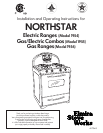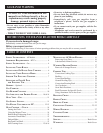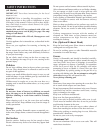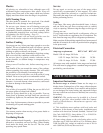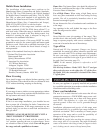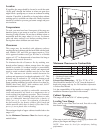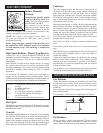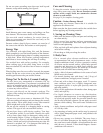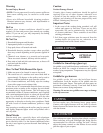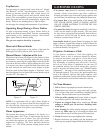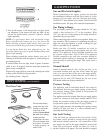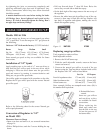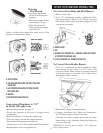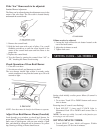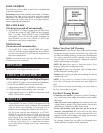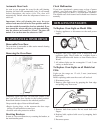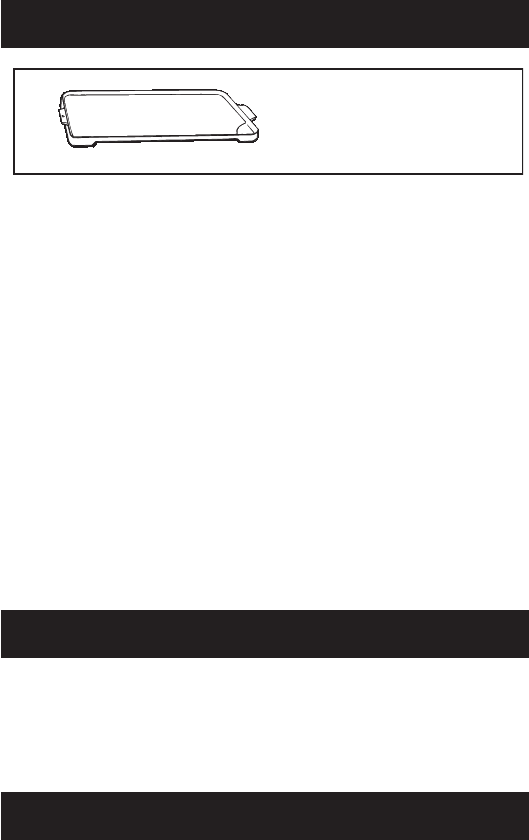
Warning
Personal Injury Hazard
• NOTE: If a wet paper towel is used to remove spillovers
from warm cooking area, be careful to avoid steam
burns.
• Never mix different household cleaning products.
Chemical mixtures may interact, with objectionable or
even hazardous results.
Do Use
Ceramic glass cleaner-conditioner should be used
regularly to clean and protect glass-smooth top cooking
surface. If you run out, you may temporarily use baking
soda as a cleaning powder.
Do Not Use
1. Household detergents and bleaches.
2. Impregnated plastic or nylon pads.
3. Soap pads; these will scratch and mark.
4. Household abrasive powders except where specified;
these may scratch depending on the pressure applied in
use.
5. Chemical oven cleaners, e.g. aerosols and oven pads.
These are caustic cleaners, and may etch the surface.
6. Rust stain or bath and sink stain removers, as these will
mark and etch the surface.
7. Metal scrubbers.
How To Deal With Burned-On Spots
1. Make sure area to be cleaned is warm to the touch.
2. The careful use of a stainless steel razor blade held at
approximately 30 degrees to the surface can be used to
remove stubborn burned-on spots from the surface.
3. Use cleaner-conditioner, and finally wipe the cooktop
clean with a paper towel or damp cloth.
If after the use of recommended materials there are some
persistent stains or marks on the cooktop, the unit should
be cleaned using a liquid cleanser. This will remove any
accumulated residue of cleaner-conditioner, and if applied
with a non-impregnated plastic or nylon pad for non-stick
pans, for at least three to four minutes, it will also take
off the film caused by salts and minerals before it has an
opportunity to discolor or develop into a problems. Finish
off with a touch of cleaner-conditioner, polish to a high
lustre.
Any smearing or streaking on the surface may be removed
with lightly dampened paper towel and polished with a
soft dry cloth.
Metal Marks
Certain metal pots, especially those with aluminum
bottoms may leave marks on the surface, especially if the
pan is allowed to slide. Use the cleaner-conditioner before
the unit is used again to prevent the mark from baking on
the surface.
Caution
Product Damage Hazard
Ceramic glass cleaner-conditioner should be applied
regularly after use of other cleaners, otherwise over
a period of time the surface of the ceramic glass may
roughen, and cleaning will become progressively more
difficult. Staining may also occur.
Important Notes
1. In the event of the cooktop being scratched, soil will
collect and appear as fine lines. These are not fully
removable, but can be minimized by the daily use
of cleaner-conditioner. These scratches do not affect
cooking performance.
2. Soil from sugar solutions must be removed from the
cooktop before the syrup has set, otherwise it can
permanently bond to the ceramic surface.
GRIDDLE OPTION
OPTIONAL
GRIDDLE
Griddle for Smoothtop (glass top)
Set griddle over a back/front burner combination. Turn both
burners on MAX for a couple of minutes or until griddle
reaches frying temperature. Temperatures may be adjusted
as required.
Griddle for gas burners
Set griddle on the left over the back/front burner
combination. Lock the notches of the griddle onto the
back & front grate fingers. First make sure that grates are
positioned on burners correctly. Turn both front & back
burners on to correct frying temperature.
Warning: Do not use two griddles on a range as damage
to the top can occur.
CANNING
For best results, use a flat bottom, heavy gauge canner.
Canners with rippled bottoms will not work on electric
burners because the bottom does not make enough contact
with the element.
GAS COOKTOP
Gas cooktops are more forgiving than electric cooktops.
Most cookware will work, although tight fitting lids are
recommended for efficient cooking on both. Always
adjust the burner controls so that flames do not extend
past the edges of pots or pans.
9



